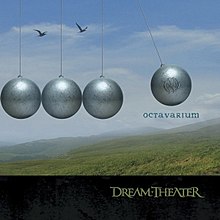| Octavarium | ||||
|---|---|---|---|---|
 Cover art by Hugh Syme | ||||
| Studio album by | ||||
| Released | June 7, 2005 | |||
| Recorded | November 2004 – February 2005 | |||
| Studio | The Hit Factory, New York City | |||
| Genre | ||||
| Length | 75:44 | |||
| Label | Atlantic | |||
| Producer | ||||
| Dream Theater chronology | ||||
| ||||
| Dream Theater's studio album chronology | ||||
| ||||
Octavarium is the eighth studio album by American progressive metal band Dream Theater. Released on June 7, 2005, it was the band's final release with Atlantic Records. Recorded between September 2004 and February 2005, it was the last album recorded at The Hit Factory in New York City. With it, the band decided to create "a classic Dream Theater album",[1] drawing upon their various stylistic influences while trying to make the music less complex. The album takes its creative concept from the musical octave.
Octavarium peaked in the top five in the Finnish,[2] Italian,[3] and Swedish charts,[4] and in the top ten in the Dutch,[5] Japanese,[6] and Norwegian charts.[7] Critical reception of the album was generally positive; the diversity of the music was praised, although critics found some of the songwriting to be inconsistent. Dream Theater promoted the album on a year-long world tour, with the majority of concerts lasting almost three hours and featuring a different setlist each night. The tour finished at Radio City Music Hall accompanied by an orchestra; this performance was recorded and released as a live album and concert video entitled Score. They co-headlined the 2005 North American Gigantour with Megadeth.
- ^ Cite error: The named reference
307-was invoked but never defined (see the help page). - ^ "Discography Dream Theater" (in Finnish). Finnish charts. Retrieved July 9, 2010.
- ^ "Dream Theater - Octavarium". Italian charts. Retrieved July 10, 2010.
- ^ "Discography Dream Theater" (in Swedish). Swedish charts. Retrieved July 10, 2010.
- ^ "Discography Dream Theater" (in Dutch). Dutch charts. Retrieved July 10, 2010.
- ^ Cite error: The named reference
JPwas invoked but never defined (see the help page). - ^ "Discography Dream Theater" (in Norwegian). Norwegian charts. Retrieved July 10, 2010.